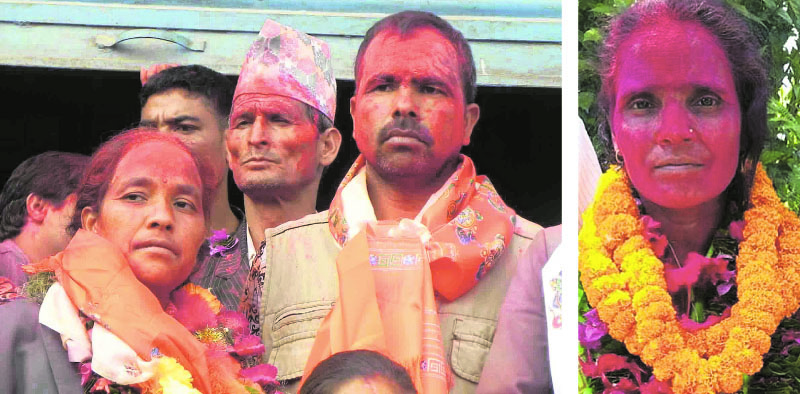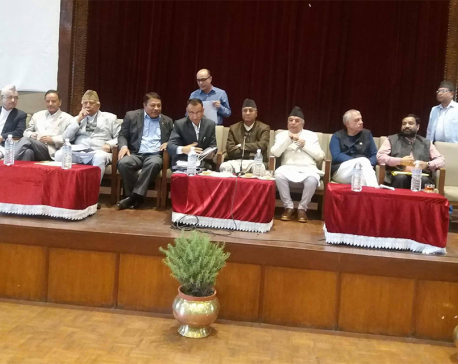
OR
Local election seen as harbinger of inclusiveness
Published On: May 18, 2017 07:21 AM NPT By: Republica | @RepublicaNepal

Kathmandu, May 17: Inclusiveness was a major theme of the decade-long conflict and of the mainstream politics since the arms were laid down by the rebels and the state.
Though the country has made some substantial improvements in addressing its inclusiveness pledges, the local elections have assisted it to in realizing it even further. The results that are still coming through, so far, reflect that the nation is moving towards inclusive development. Here are some cases from across the country where woman and Dalits have been entrusted with major responsibilities by their community:
A couple entrusted with major roles
Prem Kumari Sunar and Gopeshwor KC of Musikot municipality - 10, Nuwakot are husband and wife. And it is probably one of the happiest couple that contended in the local elections. The couple made it to the post of ward chief and deputy mayor in the local level election. Sunar has become deputy mayor of Musikot municipality and KC has become ward chief of ward no 10 of the same municipality.
“We have fierce sense of social responsibility and share the same ideology for development. Through these years we have supported each other in becoming who we are today. And with both of us entrusted with such great responsibilities, it is time for us to materialize our vision into reality. This is a great opportunity for the both of us,” said KC proudly.
Despite from different caste, the couple did not face lot of hassles for their inter-caste marriage because of their Janawadi, marriage performed by the then the rebels. After the war was over and life came to normalcy, the duo found it little bit difficult to mingle with the traditional society. Yet, their political journey remained consistent and their decades of political activism ultimately paid off during the local elections this year.
According to the couple, many of those who did inter - caste marriage during the conflict later separated. The bonding got weaker as families and relatives did not support them. “Our society is still very much dogmatic, people are not willing to change,” Sunar said. “We always dreamed of establishing the changes we talked of during the conflict,” he added.
Recollecting the circumstances that involved KC into politics, he said that he was initially not interested in politics. However, when the region was enmeshed into the armed conflict, he got affiliated to the then rebel side. “I had joined politics in 1990. She had joined politics later. But we both went underground in 1996,” KC narrated.
According to the duo, post conflict they were quite frustrated. Things were not going on well. The party joined peaceful politics but the leaders were making wrong decisions. “All that made our party weak,” said Sunar. “We even thought to give up politics but that proved to be very hard thing to do. So we made our mind and committed ourselves to the cause and ultimately our patience and consistency paid now,” she added.
“Its time to develop our society - not only physical development, but we also equally need to bring positive social changes. It’s high time that we put an end to superstitions and develop this society through scientific approach.”
Sunar focused on the need to get the society rid of caste-system. She said that the poor and marginalized people are still looked down upon and deprived of opportunities. “During the war, and right after the war, the country had different atmosphere. We really felt like we are in new Nepal. However, people’s mindset is not going to change easily. We still have a long way to go for getting rid gender, caste, creed based discriminations,” she stated.
The couple lauded the local elections stating that it materialized the vision of federalism in empowering the local units and marginalized communities, like the Dalits and women. “It is a historic beginning for Nepal. With the new setup that promotes effective decentralization, we expect for a new beginning for our community and the nation. We all must move ahead in unison for developing our community and the nation,” Sunar said.
Woman elected chief of Rural Municipality
Nepali Congress candidate Laxmi Panday has defeated her male competitors to become the chief of Hupsekot Rural Municipality of Nawalparasi district. She secured 4,468 votes to win the position. With the victory, she has become the female in the country to win the position of a rural municipality chief.
Born in Baka Malang of Palpa district, 48-year-old Panday had entered politics during her school days. But her affiliation was ideological. She has completed bachelor level education and worked as government primary school teacher at the Deurali-based Janata Higher Secondary School.
In order to fulfill her desire to fight in the local elections for the post of rural municipality chief, this year she resigned from her 20-year-old profession as a teacher and contended the election.
Panday, who currently lives in Hupsekot Rural Municipality-4, is also a former president of Nawalparasi chapter of Nepal Women Association. Along with her, another female independent candidate Kopila Malla has won the position of the rural municipality’s vice-chairperson.
Women sweep major Posts
Some female candidates have won major positions in Rasuwa in the local elections. CPN-UML’s Sita Kumari Paudel secured the position of chief in Kalika Rural Municipality, Nabina Tamang secured the position of vice chairperson in Parwatikunda Rural Municipality, Sirjana Lama became the vice chairperson of Naukunda Rural Municipality and Chameli Gurung secured the position of vice chairman in Uttargaya Rural Municipality of the district.
You May Like This

Local body staffers demand local election at the soonest
KATHMANDU, Jan 31: Various trade union leaders from the Local Body Employee Association, Nepal have urged the government to announce the... Read More...

NC roots for holding local election in single phase
KATHMANDU, April 7: At a time when talks are going on that the local-level election can be held in two... Read More...

Local development minister pledges to resolve problems related to restructuring of local unit
KATHMANDU, Sept 11: Minister for Federal Affairs and Local Development Ministry Hitraj Pandey has expressed his commitment to resolve problems... Read More...




Just In
- Govt receives 1,658 proposals for startup loans; Minimum of 50 points required for eligibility
- Unified Socialist leader Sodari appointed Sudurpaschim CM
- One Nepali dies in UAE flood
- Madhesh Province CM Yadav expands cabinet
- 12-hour OPD service at Damauli Hospital from Thursday
- Lawmaker Dr Sharma provides Rs 2 million to children's hospital
- BFIs' lending to private sector increases by only 4.3 percent to Rs 5.087 trillion in first eight months of current FY
- NEPSE nosedives 19.56 points; daily turnover falls to Rs 2.09 billion















Leave A Comment